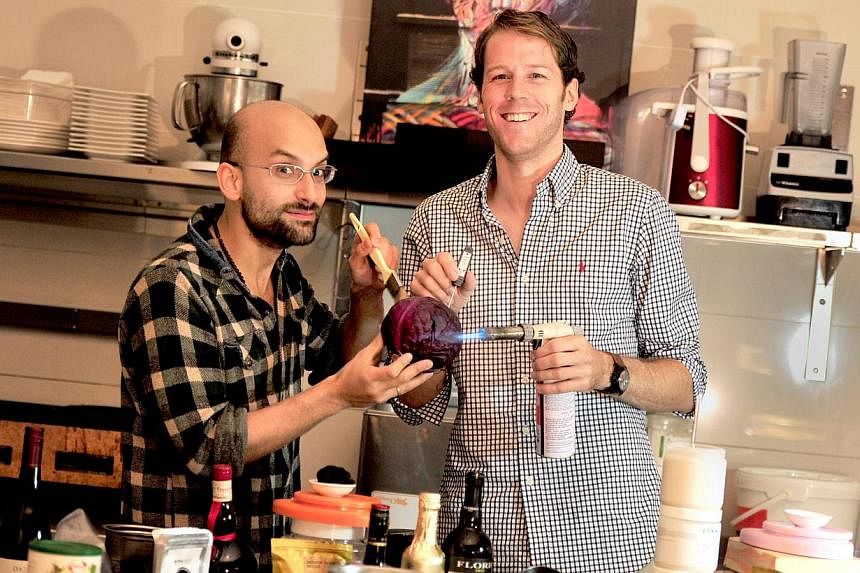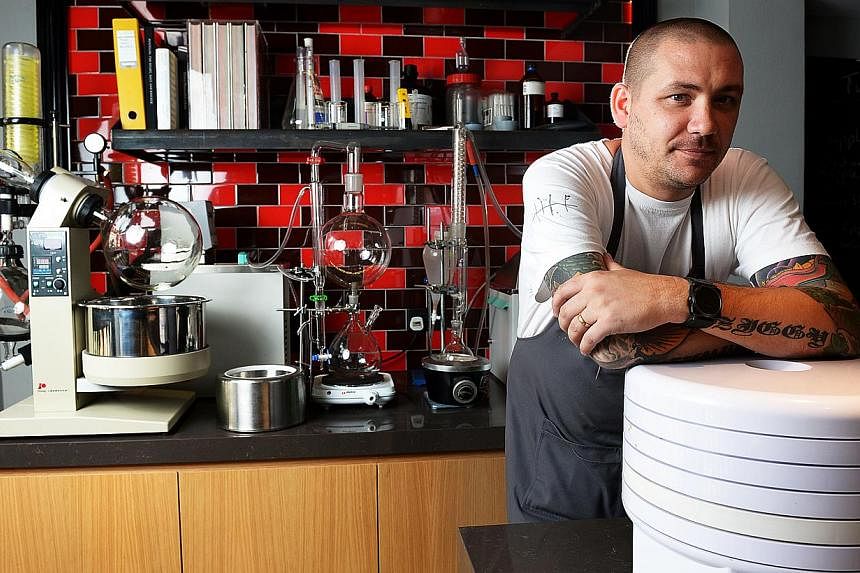Not content with just creating new recipes for diners, some chefs are going into research and development to produce new ingredients and harness cutting-edge technology to come up with new creations.
They include Tippling Club's chef- owner Ryan Clift, Bacchanalia chefs Ivan Brehm and Mark Ebbels as well as Grand Hyatt Singapore's executive chef Lucas Glanville.
All of them say having their own test kitchen space is necessary to focus on product development, away from the distractions of a busy restaurant kitchen.
British chef Clift, 37, opened his new swanky "kitchen playground", Bin 38, on the second floor of his Tippling Club restaurant in Tanjong Pagar this week, in collaboration with Australian winery Penfolds. It includes a 34-seat cocktail lounge and private dining space which seats up to 12 diners. Here, a special Penfolds eight-course wine-pairing menu costs $675++ a person.
With this new space, chef Clift, known for his avant-garde cuisine, is looking to push the food scene forward.
He says: "More of this modern gastronomy movement needs to happen. Many of the restaurants on the World's 50 Best Restaurants list have test kitchens. We need to do more in Singapore."
Restaurants on the list that have test kitchens include Noma in Denmark, which is ranked No. 1, and Mugaritz in Spain (No. 6).
Bacchanalia's test kitchen will be ready in January next year but chefs Brehm and Ebbels are working on food development projects with restaurants and big food groups that are investing in Singapore.
Chef Brehm says: "The timing for our test kitchen set-up is in tandem with the companies that we are working with, which are setting up facilities in Singapore. We feel we can positively impact the food industry at large and there is room for massive growth."
German home appliance maker Gaggenau will stock Bacchanalia's test kitchen next year. It also provides kitchen equipment for Bin 38.
The Grand Hyatt Singapore's test kitchen, a homely space that has a dining table and Miele kitchen equipment, will serve multiple purposes: It will be used to test new products and produce, host private events and train new chefs.
Chef Glanville says: "It is a luxury to have this space as standalone restaurants may not have the resources to do something like this. But it's not pretentious and will add value to our customers."
Mr Christophe Megel, founder of strategic food and beverage company A-munition, is sceptical about how much impact these ambitious test kitchens will have on the industry.
Agreeing that it is a luxury, he says: "I'm not sure how much this movement can impact or push the industry forward because how many people can afford this? By pushing the boundaries of technology, more should be done in terms of educating the industry and diners."
But for diners such as analyst Stephanie Lui, 25, the potential dishes churned out of these test kitchens pique her curiosity to try new food.
She hopes to dine at Bin 38 one day and says: "I like that Tippling Club is one of the few restaurants that use food science, but with local flavours such as a dish that mimics chicken curry. The staff also interact with diners and explain the dishes.
"Yes, it may be pricey, but I'm willing to splurge because the meal is worth it."
BIN 38
Where: Tippling Club, Level 2, 38 Tanjong Pagar Road, tel: 6475-2217, e-mail bin38@tipplingclub.com
It is part-swanky cocktail lounge and private dining space, and part-mad scientist laboratory equipped with cutting-edge technology.
Cue the mad scientist himself, Tippling Club's British chef-owner Ryan Clift, who proudly explains his fancy gadgets, which can produce intense flavours. These include sound homogenisers which emit ultrasonic soundwaves to extract, infuse and emulsify ingredients such as dressings; rotary evaporators that remove solvents by evaporation; and soxhlet extractors, which are used to extract essential oils from ingredients.
The restaurant's relocation from Dempsey to Tanjong Pagar Road in December last year was mainly for chef Clift, 37, to have a test kitchen for developing food and recipes. He says: "At Dempsey, we did have a test kitchen but it eventually became part of the restaurant kitchen. That frustrated me and that's why we had to move.
"Bin 38 is not a place for cooking demonstrations. This is a functional kitchen, not a show kitchen. I can't stress that enough."
Bin 38 is a collaboration with Australian winery Penfolds. It is named after the numbered storage "bins" in the Penfolds cellar and the restaurant's address.
In line with the Penfolds partnership, diners can opt for the Penfolds Menu, which costs $675++ a person for an eight-course meal with wine pairing. Or they can go for an indulgent Tippling Club experience (minimum spend of $5,000++ with food and cocktails), and be the first to try the chef's new creations straight from his test kitchen.
After serving the new dishes at Bin 38 for three months, the food will be served at Tippling Club's main restaurant space on the ground floor. Chef Clift will then create another menu for Bin 38 for the next three months.
To enhance the dining experience, the test kitchen also features textured cutlery by British cutlery designer William Welch. The cutlery is supposed to stimulate the palate.
For example, he has a spoon that has two chambers to hold two liquids separately. When placed in the mouth, the liquids fall onto either side of the tongue and create different sensations.
External partnerships include one with a fragrance company and with Singapore-based food scientists on topics related to the preservation of perishable and valuable ingredients. For example, using an old Japanese fermentation technique, chef Clift has been able to preserve truffles that look raw but maintain their flavour.
A new chef from Belgium is slated to run Bin 38 soon, so chef Clift - who wants to be working at Bin 38 only "from 9am to 5pm" - can also focus on Tippling Club's dinner service.
GRAND HYATT SINGAPORE
Where: 10 Scotts Road
Stepping into Grand Hyatt Singapore's test kitchen is like walking into a friend's home.
There are no fancy gadgets - just Miele kitchen equipment for cooking, a wall of jam jars and pickled ingredients, and a dining table that can seat up to 10 people.
The 322 sq ft test kitchen set-up is an extension of Grand Hyatt's executive chef Lucas Glanville's new office space. It is part of the hotel's $40-million kitchen and event space renovations, which will be completed by the end of this year.
Chef Glanville, 45, says: "It was a strategic move to set up the space for us to host guests, especially those who want to be discreet.
"Also, you can't bring a supplier into a kitchen that is preparing for a big function or wedding banquet. With this space, we can sample cook, taste and do a presentation on new products."
The cosy space is used not only for cooking, but also for staff training, meetings and hosting private dinners. It will also be used for creating and testing various in-house products for the hotel, such as mooncakes for the upcoming Mid-Autumn Festival as well as Christmas goodies, which chef Glanville is already working on.
He adds: "When you need to work six months to a year in advance, it's good to have a facility that is conducive for brainstorming."
BACCHANALIA
Where: 23A Coleman Street
Imagine "cheeseless cheese" on your dinner plate one day. This dairy-free cheese, along with ramen and sodas, are some of the new products that Bacchanalia chefs Ivan Brehm and Mark Ebbels are working on.
Even though their test kitchen will only be ready in January next year, the dynamic duo already have their hands full with projects involving restaurants and big food groups. They are working out of the restaurant kitchen for now.
Their research and development facility, which will cost about $500,000 to set up, is being carved out of the year-old restaurant's current private dining space and will have kitchen equipment by German home appliance manufacturer Gaggenau. The space will also include a chef's table for diners.
While they had initially started out consulting for restaurants, helping them with costing, sourcing ingredients and developing menus, the former Fat Duck chefs are also working on bigger-scale projects involving large American corporations that have set up offices in Singapore.
One of them is global ingredient solutions provider Ingredion which converts nature-based materials such as corn, tapioca and rice into starch, sweeteners and nutritional ingredients. The chefs are working with the company to build a new Asia headquarters to develop new products for Asian markets. It opens in November at the Biopolis.
Executive head chef Brehm, 30, says: "We bring our experience from a culinary background and discuss what we can do from product development to being able to use its products."
With technology support from American company CP Kelco - which produces gelling agents and gums for making dressings, jams and beverages - the chefs curate menus and consult with a hotel here on how to use the company's products.
They are also helping consumer goods corporation Unilever with a wine-pairing programme.
Back in the restaurant, the creative partnership has led to many new dishes being produced for the menu and these take anywhere between one day and three months to develop.
Every R&D process is meticulously documented - a practice the chefs know well from working at The Fat Duck's experimental kitchen in Bray, England.
They are also looking to build connections with academia, food historians and botanists. For instance, there is a project with the National Parks Board to develop the restaurant's garden, so it can produce more varieties of plants not found in South-east Asia.
With their experience, chef Brehm hopes they can be a "one-stop solution" for restaurants and food businesses alike.
He says: "Everything we have done comes back to Bacchanalia. There is no immediate gain sometimes, but we have a wealth of knowledge we can use for the restaurant in the future."




